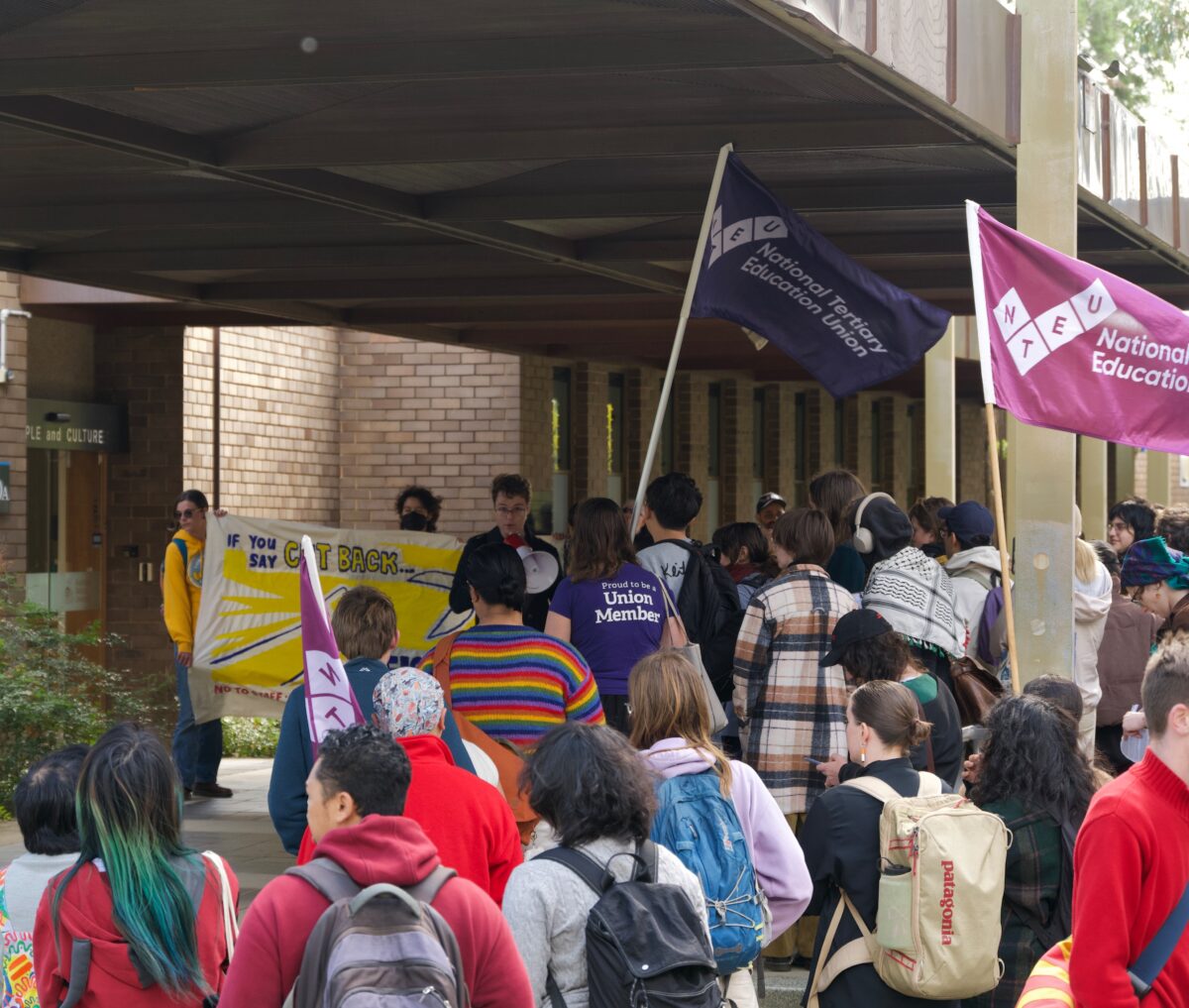On 1 May 2025, over 40 students and staff gathered at Kambri lawns for a student strike against the university’s course cuts. The protest was called by No Cuts at ANU, alongside ANUSA, the National Union of Students and the ACT Greens.
The strike was in response to ANU’s plan to cut $250 million from university expenditure, criticised by protesters for being detrimental to students’ educational experience and staff working conditions.
Co-convenor of No Cuts at ANU, Lucy Chapman-Kelly, told attendees, “Students demand a say over their education, and are sick of this university administration.” Protestors chanted “Our education is under attack, what do we do?” “We fight back!”
ANU’s announcement of expenditure cuts late last year have impacted many programs and courses, leading to major changes and restructuring. This includes a reduction in academic colleges, the cancellation of courses, and reduced feedback and tutorial slots across the board.
Organisers of No Cuts at ANU have stated three demands:
- Completely freeze and reverse the cuts and restructuring of “Renew ANU.”
- Sack Vice Chancellor Genevieve Bell and Chancellor Julie Bishop. More than 95% of the staff union voted to say they had no confidence in Bell and Bishop.
- The ANU should open the books and be held accountable to students and staff about their budgetary situation.
ANU’s research fellow and candidate for ANU council Francis Markham criticised the course cuts for impeding students’ learning experience. “Majors, minors, career paths, people’s plans for their PhD, all these things are disrupted. Everything becomes worse and harder for students.”
He also demanded more transparent communication from the university’s leadership on financial statements, stating, “We don’t know what’s happening with the finances, our questions are not being answered. We’re here to ask for honesty.”
For staff, the cuts have meant around a $100 million in deduction from salaries payable, with the NTEU estimating a loss of 650 ANU jobs by 2026.
In March, more than 450 ANU staff signed an open letter in response, calling for more transparency into the university’s planned restructuring and financial situation. In their response, the University’s Provost and Chief Operating Officer acknowledged “that understanding any Australian university’s financial position is complex, and ours is clearly no exception”, but defended their transparency and “sense of responsibility”. They maintained that “The University has not initiated this process lightly, nor is it exaggerating the challenges we face.” It disputed some of the letter’s statements as “misunderstandings” or “factually incorrect”.
The second speaker, Jo Rocke, senate candidate for the ACT Greens, emphasised his disappointment on the government’s lack of action regarding university cuts. “Both major parties are washing their hands of it, refusing to do anything to fight for it (the cuts).”
The final speaker, ANUSA International Students’ Officer Seungbin Kang, condemned the government’s use of an international student cap to conceal their inefficiency, “In the moments that government cannot address issues in this country such as housing, such as education, they look to international students to blame. We know that’s not true. This is a struggle for basic dignity and respect.”
In January, the University of South Australia published a report revealing that international students were not to blame for the housing crisis, and emphasising that the government shouldn’t be “scapegoating international students for the rental crisis.”
Following Kang’s speech, protesters marched towards Chancelry Building while chanting, “Genevieve Bell, you don’t care, you’re a bloody millionaire!”
Protesters stuck posters on walls of the Chancelry Building, outlined the strike’s demands for reversal of all course cuts, to sack VC Bell and Chancellor Bishop, and to open the books on university budgets.
Two students from No Cuts at ANU expressed their anger against the course cuts stating, “We want regular tutorials, we want to finish university with the degrees we enrolled in.”
Students are generally able to complete the degrees they commence, even if that program is disestablished. This may, however, become more difficult when courses are removed from offering.
Elle, a student protester, told Woroni, “May 1 is a historic day of workers fighting back against their bosses. I want to stay in that tradition and show that students and staff can actually fight back here.”
“The ANU administration has demonstrated their lack of care for student education and staff working rights,” said James McVicar, National Union of Students Education Officer. “That is why students are calling to sack Bell and Bishop, and reverse the cuts.”
We acknowledge the Ngunnawal and Ngambri people, who are the Traditional Custodians of the land on which Woroni, Woroni Radio and Woroni TV are created, edited, published, printed and distributed. We pay our respects to Elders past and present. We acknowledge that the name Woroni was taken from the Wadi Wadi Nation without permission, and we are striving to do better for future reconciliation.
